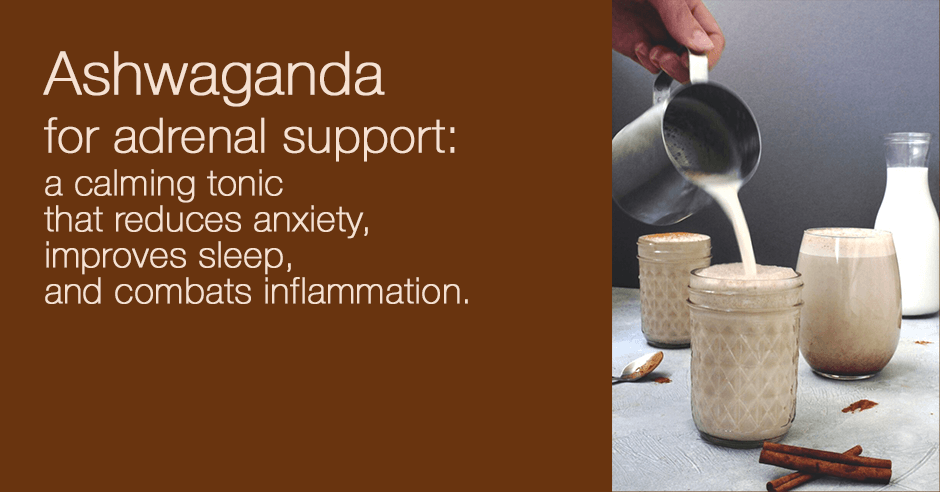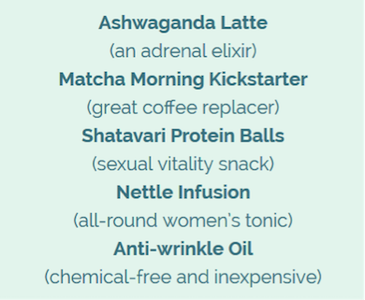
Overactive adrenals can leave you feeling like you’re constantly in “fight or flight” mode. First, your body releases high levels of stress chemicals like adrenaline and cortisol. To ensure you’re ready to defend yourself or run, these chemicals spike your blood sugar, as well as increasing heart rate, blood pressure, and insulin levels – making you feel anxious, stressed and wide awake at night.
Nature offers plenty of wonderful herbal remedies to support the adrenals. Herbal adaptogens such as ashwaganda and rhodiola are two of my favorite herbs for the adrenals. They gently calm your overactive system helping your body damp down your fight or flight response and reduce stress and anxiety.
- Ashwaganda is often called “Indian Ginseng” and is widely used in Ayurvedic medicine to lower stress and stabilize thyroid hormones. It is a calming tonic that reduces anxiety, improves sleep, and combats inflammation.
- Rhodiola is a another potent herbal adaptogen that helps your body reduce anxiety and irritability. At the same time, it boosts immune function, hormonal balance, and concentration.
You can learn how to use herbs like this in your everyday routine in this no-cost online workshop “How To Use Everyday Herbs and Spices To Rebalance Your Hormones”
In this online workshop, you will learn about 20 healing herbs and spices to help support and heal your thyroid, adrenals, menopause, weight, hair loss, cellulite, PCOS, hot flashes (and more).
- Skullcap – used to treat conditions like panic attacks, anxiety and also helps to promote better quality sleep.
- Chamomile is well known for its calming properties. After people drink chamomile tea their levels of glycine increase. Glycine is a nerve relaxant with mild sedative properties – all things that can help you to de-stress. Chamomile also has anti-spasmodic properties that help to relieve menstrual cramps in women. It also contains a potent flavonoid called apigenin, a mild tranquilizer that can help benefit sleep onset and sleep quality.
- Lavender made into a tea is an effective tonic for jittery nerves because it encourages a calmer state of mind. Research comparing the use of lavender to (synthetic) benzodiazepine medication for anxiety has found it provides equal benefit, minus all the side effects.
You will also learn 5 simple and delicious herbal recipes to restore and rebalance your hormones
Watch this video snippet to get a taste of some of what Magdalena will be covering in the online herbal workshop. One thing she’ll be making is the wonderful and nourishing Ashwaganda Latte for adrenal support.
And here is the recipe for the Ashwaganda Latte
Author: Magdalena Wszelaki
Ingredients
- 1 cup of milk (almond or hazelnut works well, if using coconut milk, I would suggest ½ cup coconut milk and ½ cup water)
- 1 teaspoon ashwagandha powder
- ½ teaspoon cinnamon powder
- ½ teaspoon maple syrup or honey
How To Make
- Warm the milk, then add the powdered spices and maple syrup or honey
- Stir well, using the whisk to blend, adjusting for sweetness if necessary
- Pour into a nice cup and drink an hour before bed
Equipment: Medium saucepan, whisk, strainer
You’ll also learn how to avoid common chemicals found in everyday skincare, personal care and house cleaning products that disrupt your hormones, and discover which herbs are best for your individual needs.
Hope to see you there! You can register for this online herbal workshop here
You may remember Magdalena from the Anxiety Summit and her wonderful interviews on eating for hormone balance! She is now taking hormone balance to the next level by teaching us how to use herbs. This wonderful workshop is a taste of what’s to come in her upcoming longer program so stay tuned for more on that!



Oh my Trudy I’ve just been looking at this herb. I’ve managed to come down with Bells Palsy on BOTH sides of my face and Lymes Disease and have been bedridden the last month. I’m starting a new protocol (including this herb) by Stephan Buhner and have noticed a few improvements but ohhh it’s so slow.
Thanks for all you do…
Rita
(Yes with 4 boys, 3 with autism and mom with dementia, )
Rita
I am so sorry to hear this – you poor thing. If you’re working with someone using Stephan Buhner’s protocols it sound like you are in good hands. Dr. Jay Davidson is a wonderful Lyme disease resource who offers phone consultations if needed.
And yes the herbs are much slower than the amino acids but slow and steady improvements are ok too.
Is the Bell’s Palsy related to the Lyme disease? I don’t know much about Bell’s Palsy but found this for you “Physical therapies including tailored facial exercises, acupuncture to affected muscles, massage, thermotherapy and electrical stimulation have been used to hasten recovery.” https://www.ncbi.nlm.nih.gov/pmc/articles/PMC5478391/
Thank you Trudy (for always remembering me)
I don’t have a doctor using Stephans protocol but read the books and put together a protocol based on his. So far it’s working as I am doing much better than I was…still a ways to go.
Tryptophan and Inositol are two I’m taking they work for brain inflammation..imagine that!?
And yes I’m trying to get a Physiotherapist… and doing some facial massage myself. Did some cold lazer therapy (Until I got vertigo and had to stop driving) and Stephan recommends stephania herb..which i have coming. Bells palsy is common with Lymes I’ve learned.
Right now I have pain in my face, and a few twitches so hoping that’s a good sign.
Thank you Trudy.
Rita
Hi Trudy
Thanks again for all your fantastic info.
I have taken Ashwagandha for quite some time, not sure there is much effect on my anxiety but it helps amazingly with my achilles tendonitis so it is a defininte keeper.
I tried Rhodiola, but one of its side effects is that it can lower your blood pressure. That obviously happened in me and as I already have very low blood pressure, it made me quite dizzy so I had to stop taking it.
One new herb I have started recently is Holy Basil, also called Tulsi, (Ocimum tenuiflorum). It has a very subtle calming effect. Not huge, but definitely an effect and there are not many things that seem to any any effect on my anxiety so I was really pleased that this did. I have it as a tea.
Some research on Holy Basil:
https://www.ncbi.nlm.nih.gov/pubmed/22455995
https://www.ncbi.nlm.nih.gov/pubmed/17850106
Evidentally it is the Ocimumosides A and B in the Holy Basil that have the effect.
Natalie
Thanks for the feedback and Holy Basil resources – it’s another favorite of mine. I’ve not had anyone report dizziness from rhodiola but since we are all biochemically unique we must simply find what works for us
Yes I was disappointed that I couldn’t take the Rhodiola
According to research it can act as an ACE inhibitor
https://www.ncbi.nlm.nih.gov/pubmed/16837437
which is the mechanism by which it would lower blood pressure.
My dizziness is just from the lowered blood pressure
Hi Trudy,
I love Ashwaganda, too. It is, however, slightly heating so may not be comfortable at all times for all people due to that property (menopause, as an example). I sometimes use Shatavari, which can accomplish the same thing, but has cooling properties from an Ayurvedic perspective.
I drilled into this a bit at banyanbotanicals.com, to learn more about other options, which is how I landed on Shatavari. It works pretty well. Depending on what my body is up to, I’ll alternate as appropriate.
I love your newsletters!
Karla
Thanks for sharing. I know Dr. Aviva Romm is a fan of shatavari. I blogged about it here when I reviewed her newest book “The Adrenal Thyroid Revolution: A Proven 4-Week Program to Rescue Your Metabolism, Hormones, Mind & Mood” https://www.everywomanover29.com/blog/adrenal-thyroid-revolution-book-aviva-romm/
“Shatavari is considered the “queen of herbs” in Ayurvedic medicine, where it is beloved as a rejuvenating tonic for women. It is nourishing and calming as well as hormonally balancing, and is used for irritability and many hormonal imbalances affecting the mood.”
Glad you enjoy my newsletters!
Excellent blog post re shatavari and the Thyroid Adrenal book. I’m glad I commented especially for this additional content. Thanks!
Should ashwagandha be taken before bed or during the day (worried about it impacting sleep)
I’ve read that rhodiola lowers stress hormones and has both antianxiety and antidepressant benefits. Additional information with the supplement indicated side effects could include insomnia, anxiety, agitation, headaches. Do you have recommendations of how to take to avoid these potential side effects? It is a 100 mg supplement.
Sharon
If a client had these side-effects we’d look for another approach.
I’m wondering if you have recommendations for morning-time and evening-time adrenal supplements. I’ve been having chronic insomnia for 4 months. While I am improving, I feel my adrenals could use some extra support.
Hello Trudy,
What nutrients/supplements do you recommend when an adrenal saliva test shows low DHEA but all 4 cortisol readings within range?
What factors might be behind a low DHEA with normal cortisol levels?
Do you recommend any other testing when a female teen has such test results?
Thanks so much. Blessings.
This is an open question to anyone. Has anyone taken Ashwagandha at the same time as antidepressants with positive results? My niece has had a lot of mental stress in her life. Recently, she’s been in the hospital where they inserted a feeding tube because she hasn’t been able to keep food down. The past couple of weeks, she’s been waking up at 5 am with anxiety. The doctor put her on Citalopram 10 mg which she will have been on for one week in a couple of days, so it hasn’t “kicked in” yet. Today, her anxiety attack lasted from around 5 am until about noon. I have anxiety and Ashwagandha Complex from Standard Process and Gaba have really helped me, so I called a compound pharmacist to make sure there weren’t any interactions and they only knew that Gaba was okay. I don’t want to make her worse. My niece tolerated the Gaba well and actually fell asleep off a 100 mg dose added to her feeding tube. My sister and I went to a vitamin shop and bought Ashwagandha drops so the strength could be controlled and easily added to a feeding tube. I would really appreciate it if anyone could tell me their experiences one way or another.
Hi Trudy,
Just came across something called CONGENITAL ADRENAL HYPERPLASIA (CAH) which as I understand it causes problems with adrenals and cortisol. There are classic and non-classic forms of CAH.
Salivary Adrenal/ Stress tests that show problems with 17-OH PROGESTERONE might be the first signal that such a condition is present (the 21-hydroxylase enzyme is involved). One site quoted an Indian medical journal suggesting Ashwagandha can help in the more mild forms of CAH.
1. Do you know if this condition might be a hidden root cause of conditions like Pyroluria, stress disorder, anxiety and the like for some folks?
2. Might you know the best way to test and treat it and if there any effective natural remedies versus drug therapy?
3. Any helpful resources would be appreciated!
Thanks so much!
Beth
I’m not familiar with CAH so can’t answer your questions. I’d look for a functional medicine endocrinologist to work with